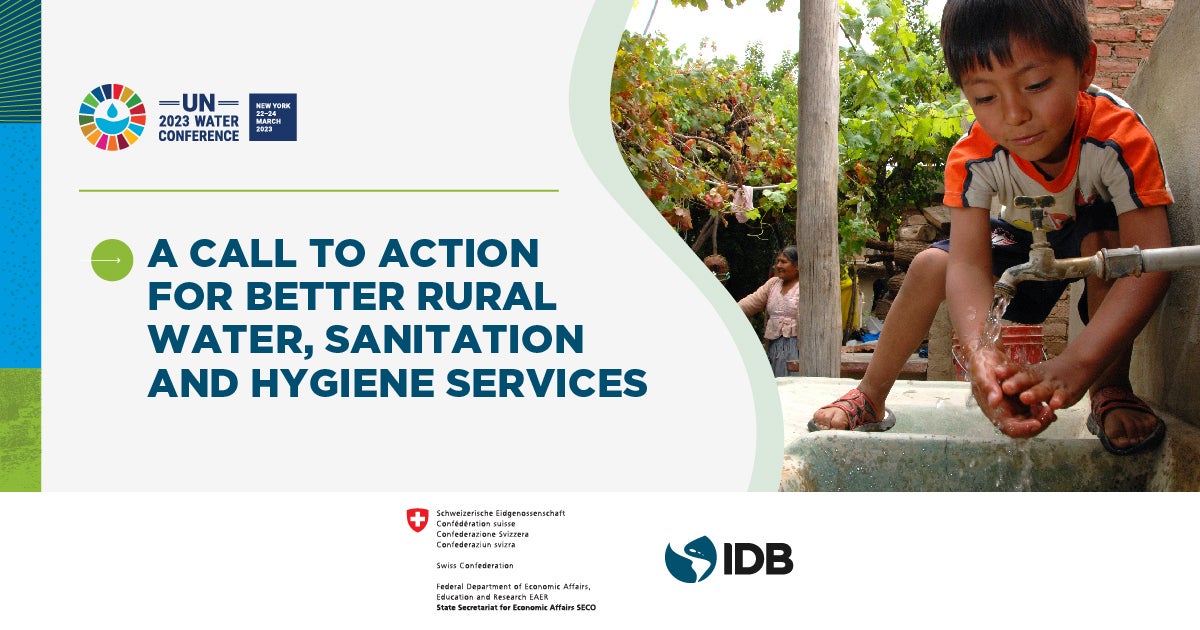Rural communities are essential for our society, environment, and economic growth. They grow our food, support our natural resources, and nurture and maintain our cultural diversity. Their wellbeing depends on access to clean, affordable and sustained water and sanitation, and hygiene (WASH) services. Yet, we are far from reaching universal water and sanitation. In rural areas, 8 out of 10 households do not have access to basic water services and 6 out of 10 do not have basic sanitation.
Vulnerable rural communities always get the short end of the stick when it comes to water and sanitation. They often live in hard to reach, low density areas that are afflicted with low socioeconomic activity, limited institutional presence, and greater vulnerability to climate-change related natural disasters. These challenges increase costs per unit, limit the effectiveness of traditional technologies, and prevent operators from providing technical assistance to ensure the sustainability of systems. As a result, national and subnational governments are reticent to prioritize investments that could overcome the access gap and sustain rural services in the long-term.
To combat this trend, the African, Asian and Inter-American development banks, in partnership with AMCOW, will launch a joint global Call to Action to prioritize rural WASH. Water for All and the Rural Water Supply Network, through the Skat Foundation, are currently elaborating a document on the challenges of rural WASH services, which will be presented at the UN 2023 Water Conference.
In Latin America and the Caribbean, the Inter-American Development Bank (IDB) leads a regional policy dialogue with governments, sector entities, academia, and civil society to better address rural WASH. This consultation process began in 2022 with AECID, SDC and One Drop. At that year’s LatinoSan – the triennial regional policy discussion on water and sanitation – high-level government representatives discussed national assessments, which led to the inclusion of specific rural WASH targets in the LatinoSan Declaration. The IDB is working with these stakeholders to design a Call to Action and plan regional discussions, policy workshops and other activities to better understand challenges. All of these efforts will lead to the creation of a specific roadmap to support countries invest in better rural WASH services.
Calls to action are not sufficient; we need practical tools. In 2023, the African, Asian and Inter-American development banks and AMCOW will promote South-South exchanges for rural WASH investments under SIRWASH (the Sustainable and Innovative Rural Water, Sanitation and Hygiene program financed by the Swiss Agency for Development and Cooperation (SDC)). SIRWASH enables policy, innovation and knowledge exchange environments and builds capacities to deliver sustainable and quality WASH services to rural communities, with a particular focus on vulnerable and disadvantaged populations.
Through this program, the four organizations will coordinate cross-continental exchange for better rural WASH services. They will promote policy dialogue at a high level, share best practices through in-person visits and virtual exchanges between sector entities, WOP-LAC and other global networks, and strengthen the rural focus of the global community of practice in alliance with RWSN and SuSanA. They will also lead a series of webinars for rural WASH professionals to exchange on approaches that bring added value to all regions, and a capacity building program based on state-of-the-art virtual tools, with a focus on young professionals and gender balance.
These partnerships, calls to action, and activities will help countries reach universal access to water and sanitation services in rural areas. Our economies depend on these communities, and it is time we overcome barriers to meet their needs.
Find out more here:
- Reaching the Last Mile: Providing Water and Sanitation Services to Dispersed Rural Communities
- Interaction between Rural and Urban Areas in Water and Sanitation Management: A Strategy for the Santiago Water Company in the Dominican Republic (CORASSAN)
- Efectos del Programa de Agua Potable y Saneamiento para Pequeñas Localidades y Comunidades Rurales en Bolivia: resultados de la evaluación de impacto intermedia (only in Spanish)
About SIRWASH
The program for sustainable and innovative water, sanitation and hygiene services in rural areas -SIRWASH, has the technical and financial support of the Swiss Agency for Development and Cooperation (SDC). Its objectives are aligned with the global commitments of the United Nations 2030 Agenda to enable policy, innovation and knowledge sharing.
The program also seeks to promote the necessary capacities to provide quality and sustainable services in rural communities with a particular focus on vulnerable and disadvantaged populations across four countries in Latin America and the Caribbean. The IDB is implementing the program in Bolivia, Brazil, Haiti, and Peru to close gaps in rural services (acceptability, affordability, sustainability).


Leave a Reply